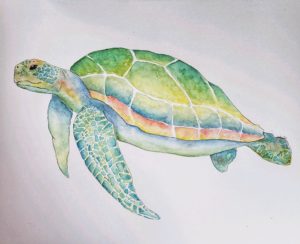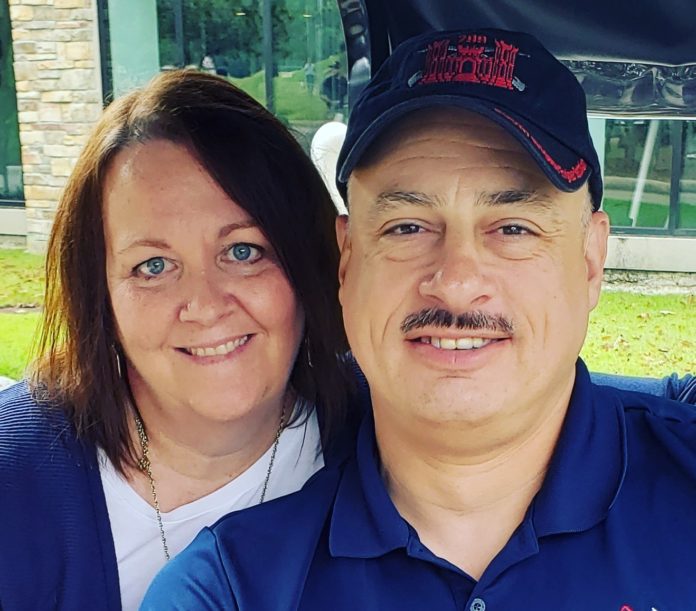Military life has plenty of challenging situations, and the conditions of the COVID-19 pandemic have raised the stress level of those challenges for military families. Army wife Judy Davis, author of Right Side Up: Find Your Way When Military Life Turns You Upside Down, says her experiences have reinforced the importance of building strength to draw on before a crisis happens.
“It all comes down to how you fill yourself up,” says Judy. “What do you do when you don’t have any more to give, but the demands on your life are such that you can’t check out? What resources have you put in place that you can draw on?”
“It all comes down to how you fill yourself up. What do you do when you don’t have any more to give, but … you can’t check out? What resources have you put in place that you can draw on?”
–Judy Davis
When the pandemic shutdown began in the United States, Judy was already managing a new way of life. Her husband, Geoff, was injured in a training accident in 2019, which resulted in the amputation of his left leg above the knee. The Davises had recently moved from Washington state to Texas to be closer to Brooke Army Medical Center in San Antonio for Geoff’s care.
For the previous months, Judy’s time and attention had been taken up by managing Geoff’s care and getting ready for the move. Not long before they were set to drive across country to Texas, Judy had experienced a stroke, likely brought on by stress. After her recovery, she couldn’t be behind the wheel for long periods, and Geoff had only been driving again for a couple of months.
“We had to let go of our expectations of what the road trip should be,” says Judy. “We took our time. We had to. It took ten days, when normally we would have done it in two. When we let go of our expectations of what the move was supposed to look like and what we had planned and just went with what was, it was a whole different experience. We had the time of our lives.”
After the move to Texas, Judy’s mom came for a two-week visit that stretched into several months when pandemic travel restrictions took effect. Judy’s caregiving responsibilities multiplied, as she cared for both her mother and her husband.
Judy recalls her stress levels shot up during this period, and none of her regular coping strategies were working. Her daughter suggested she try something new, watercolor painting. Using a set of Crayola watercolors she’d bought for her grandchildren, Judy put on some mellow music, picked up a brush, and started painting. Again, Judy found relief in letting go of expectations.

“I had never painted before, and I had no attachment to what the end result would be,” says Judy, “It’s not about the end product, it’s about the process of doing something that is so unfamiliar and getting absorbed by it, a positive something. I unleashed something my soul was craving.”
In the process she also discovered a hidden talent and has been selling her work and taking commissions for paintings. She shares her creations and Geoff’s woodworking on Instagram.
Judy recalls many times in military life when she felt overwhelmed, but none were more dramatic than her husband’s injury. At one particularly difficult point, she recalls someone suggested she read her own book, Right Side Up.
“They didn’t realize I had written it,” she laughs, “but honestly, I couldn’t read anything when my life was turned upside down. It’s important to build up resources and coping strategies before the crisis. Right Side Up is the book you need the minute you become a military spouse. You need to be handed Right Side Up and Military Spouse Journey, and that’s your life.”
Military Spouse Journey: Discover the Possibilities & Live Your Dreams is a book by by military spouses Kathie Hightower and Holly Scherer.
Difficult experiences offered Judy many opportunities to live out her own words, building on a foundation she had already established, even when events veered far off script. She rediscovered the importance of letting go of expectations, taking time for self-care and managing stress. For Judy, another important strategy when dealing with change is looking for the positive side of each challenge.
Judy says the pandemic restrictions—although complicating Geoff’s medical care in many ways—also reduced some of the busy-ness that was overwhelming her. She had left her work as a speaker and consultant to care for her husband full time after his injury, and she was taking little time for herself.
“It made me realize that my life had become just being a caretaker,” says Judy. “I will be that, but I also need more for me. There’s nothing wrong with that. That’s the gift quarantine gave me. I realized having something to fill me up and make my heart happy didn’t have to come second to taking care of my husband.”
“I realized having something to fill me up and make my heart happy didn’t have to come second to taking care of my husband.”
~ Judy Davis
Later, Judy and Geoff felt the effects of the pandemic in another way, when they were each diagnosed with COVID-19. Both have since recovered. Throughout these challenges, she says, painting gives her focus, time for herself, and opportunities to learn.
“I had an awareness that I wasn’t being true to myself, so I was open to hearing other things,” says Judy. “Immersing myself in artistic expression gives me a break from the stress of everyday life to teach myself something new. It frees me and fills me up. My mind gets full of things that are separate from the stress of my life. No choice that I make when I watercolor is going to impact my life.”
As Judy discovered on her cross-country trip, letting go of expectations is the key to finding joy in the journey.
Related stories from Military Family Life
- Managing Stress: Self-Care is not Selfish, featuring army wife and caregiver Pamela Stokes Eggleston
- Navigating the Emotions of Change, featuring Judy Davis
- Lifelong Military Friendships Grow with Care and Communication, featuring Kathie Hightower and Holly Scherer


